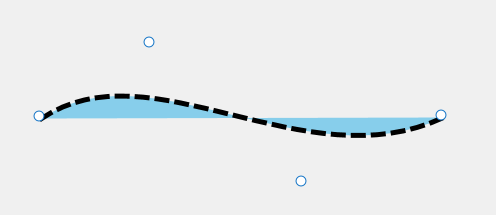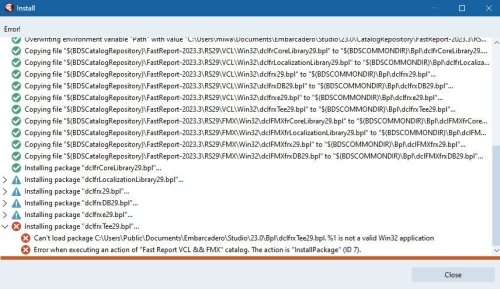-
Content Count
71 -
Joined
-
Last visited
Posts posted by Mike Warren
-
-
I tried it like this, which shows I don't understand interfaces properly:
IapShape = interface procedure SetThing(AThing: Boolean); property Thing: Boolean read FThing write SetThing; // Error here: Field or method identifier expected end; TapRectangle = class(TRectangle, IapShape) private FThing: Boolean; procedure SetThing(AThing: Boolean); public property Thing: Boolean read FThing write SetThing; end;
-
I don't exactly need multiple inheritance (I think), but I'm trying to find a clean way of doing the following (This is simplified):
This is in FireMonkey, if that makes a difference.
I have 2 classes; TapRectangle, inherited from TRectangle, and TapCircle, inherited from TCircle.
I want to retain all the properties and methods of the ancestor classes, but I want to add some new methods and properties, which are the same for both TapRectangle and TapCircle, so I can't inherit from TShape.
I also want to be able to pass a TapRectangle or TapCircle to a function and access these new properties and methods.
Is there an elegant way of doing all this?
I can achieve what I want by copying the new properties and methods to each new class and the using the common ancestor TShape to pass my components, but it's not elegant.
I've actually never used interfaces, but from what I understand that wouldn't work here. Please correct me if I'm wrong.
-
Many years ago I wrote a small D7 program for logging from applications I was developing. This used WMCopyData and a few other Windows APIs and it was really robust. I used it for many projects.
It was great in that it could keep logs right up to the point of failure with almost no impact on the performance of the main program.
The problem I have now is that I want to do the same thing for multi-device applications in FMX.
My initial thought is to make it a network application, but I'm wondering if there's a better method I don't know about.
Does anyone have any suggestions?
Also, I haven't done any network applications for many years. Is Indy still the go-to for network coms that's reliable and lightweight?
-
Is the version of Fast Reports FMX supposed to be able to export PDFs?
When I right-click on the preview window the popup menu has "Export" and "Export PDF", but neither of these do anything at all.
I also notice the VCL version doesn't have these export options in the pop-up, which makes me suspect the menu items were accidentally left in the FMX version.
-
Installing Tee Chart did the trick. Thanks Tom.

-
-
57 minutes ago, Nigel Thomas said:Actually, that StackOverflow thread looks like it might contain the answer in the second reply.
Overriding the CanShow method seems to stop the flash.
function TForm1.CanShow: Boolean; begin Result := not Timer1.Enabled; end; procedure TForm1.Timer1Timer(Sender: TObject); begin Timer1.Enabled := False; Left := 500; Top := 200; Visible := True; end;
-
Thanks for the reply, Nigel.
Unfortunately, the form flashes up briefly at the default position and size before being hidden.
Below is something I just thought of. It seems to work fine on Windows. I'm not able to test on Mac at the moment.
unit Unit1; interface uses System.SysUtils, System.Types, System.UITypes, System.Classes, System.Variants, FMX.Types, FMX.Controls, FMX.Forms, FMX.Graphics, FMX.Dialogs; type TForm1 = class(TForm) Timer1: TTimer; procedure FormCreate(Sender: TObject); procedure Timer1Timer(Sender: TObject); private StartLeft: Integer; public { Public declarations } end; var Form1: TForm1; implementation {$R *.fmx} procedure TForm1.FormCreate(Sender: TObject); begin StartLeft := Left; Left := MaxInt; Timer1.Interval := 4000; Timer1.Enabled := True; end; procedure TForm1.Timer1Timer(Sender: TObject); begin Timer1.Enabled := False; Left := StartLeft; end; end.
-
In the past all I needed to do was add Application.ShowMainForm := False, but FMX does not have ShowMainForm.
Setting the main form's Visible property to False, either at design time, or in Form.Create does nothing, and adding MyForm.Visible := False to the application anywhere before Application.Run causes an A/V.
I need this to work on Windows and Mac, so a WinAPI solution is not suitable.
Does anyone have a suggestion?
-
I just tried a FMX NumberBox in D11.3 and D12 and find it a complete mess. Nothing about the operation is intuitive.
In addition to your observation, if I try to highlight the text by clicking and dragging, any vertical mouse movement at all changes the value wildly. Ctrl+A does not work for me.
Personally, I'd do my own thing and forget TNumberBox completely.
-
15 hours ago, Vandrovnik said:When importing settings using Migration Tool, there is a button "Version Migration", which probably should (must?) be used when upgrading from 11.3 to 12. At least I have used it and got no errors.
That's what I used the first time where everything got messed up. I skipped it on the second installation and in the small amount of testing I've done the installation seems to have worked fine.
-
Installing D12 was "fun" for me.
I made the stupid mistake of trying to import settings from V11.3 and got dozens of errors during the install and each time I ran it.
Tried uninstalling, and that took ages before finally locking up. Tried the uninstaller again, and got told it couldn't uninstall without telling me why.
Fortunately, I run Delphi in a VM, so I just created a new duplicate of my working dev VM and installed it from there. Don't really understand why the "offline" installer spent most of its time downloading things, but finally it completed.
One of the bugs that was causing me problems is fixed. Another has supposedly been fixed, but has not, and within the first 10 minutes I found a couple of new bugs.
I'm looking forward to the first maintenance release.
-
This issue is mostly fixed in D12. Only tested on Windows so far.
Accelerator keys work in TMainMenu and on TButton.Text without causing a Windows beep. Shortcuts using Alt+<letter> do not work in menus, but they do work in actions.
Alt + the first letter of a root main menu item will open that menu and then the first letter of each sub-menu item will highlight it, but not select it.
So even though this is not exactly the behaviour in VCL, at least it's workable.
-
It doesn't appear to be fixed to me.

-
On 9/19/2023 at 5:07 AM, XylemFlow said:Funny. That bug was reported by me, but I hadn't considered that it would cause problems in my demo.
Looks like this bug has been fixed in D12 according to the QC. I haven't installed D12 yet to check.
-
A simplistic approach might be to use MouseDown and trigger a timer. In MouseUp reset the timer if it hasn't expired. I haven't put a lot of thought into this, but feel it should be possible to make it work.
-
Okay, this seems to work:
var P1, P2: TPointF; begin // Mouse location on page before zoom P1 := (sbView.ScreenToLocal(Screen.MousePos) + sbView.ViewportPosition) / CurrentPage.Zoom; if WheelDelta > 0 then begin Z := CurrentPage.Zoom + 0.1; if Z > 4 then Z := 4; end else begin Z := CurrentPage.Zoom - 0.1; if Z < 0.1 then Z := 0.1; end; // Mouse location on page after zoom P2 := (sbView.ScreenToLocal(Screen.MousePos) + sbView.ViewportPosition) / Z; sbView.ViewportPosition := sbView.ViewportPosition + ((P1 - P2) * Z); CurrentPage.Zoom := Z;
-
2 hours ago, dwrbudr said:How is your code supposed to work since you don't use at all the mouse position in the code?
Good point. This is simplified because I couldn't get it to work in a way that makes sense to me.
I have a member that gets set in the page's MouseMove event:
FMouseOnPage: TPointF
But I took that out for testing, expecting the zoom to at least stay centred. But It does that weird curve.
-
I don't know what I'm doing wrong, but I can't seem to get this to work properly.
For each page (TFrame) I have a TScrollBox that contains a number of Layers (TScaledLayout), which in turn contain a bunch of components.
I zoom in and out using the mouse wheel and want the position of the frame to remain visually locked to the mouse cursor as I zoom. What I thought would work would be to change the Scrollbox.ViewportPosition as I zoom, but this produces a non-linear movement (a strange curve). Each step of the mouse wheel changes the zoom in 10% increments. Here's the code:
if WheelDelta > 0 then begin Z := CurrentPage.Zoom + 0.1; if Z > 4 then Z := 4 else CurrentPage.sbView.ViewportPosition := CurrentPage.sbView.ViewportPosition * 1.1; end else begin Z := CurrentPage.Zoom - 0.1; if Z < 0.1 then Z := 0.1 else CurrentPage.sbView.ViewportPosition := CurrentPage.sbView.ViewportPosition / 1.1; end; CurrentPage.Zoom := Z;
This is the Zoom code:
procedure TfrmPage.SetZoom(const Value: Single); var I: Integer; begin FZoom := Value; for I := 0 to LayerCount -1 do Layers[I].Zoom := FZoom; end; // The layer frame is not shown. Instead, the ScaledLayouts are parented to the page frame's scrollbox procedure TfrmLayer.SetZoom(const Value: Single); begin FZoom := Value; slContent.Width := slContent.OriginalWidth * FZoom; slContent.Height := slContent.OriginalHeight * FZoom; end;The video below shows what happens. What am I doing wrong?
-
Done.
-
On 8/16/2023 at 11:32 PM, XylemFlow said:I do have a better solution now though, after seeking support from Embarcadero. The solution prevents the Alt key being processed while the mouse button is down, but it does require editing a local copy of FMX.Platform.Win.
Excellent! If you do report it, post the link here and I'll vote for it.
-
Thank you both. I really appreciate your help. Sorry for the delay getting back to this thread. I've been sick and haven't had a chance to delve into this yet.
-
I've just started to look at this and have a problem already.
I need to be able to edit these paths later which means I have to be able to click on them. The path is clickable, but it doesn't exactly follow the line. It's an area (shown in blue on the attached image. Ideally, I'd like to detect a click near the line (maybe 4 pixels either side and not the area the TPath exposes. At this point the only thing I can think of is going to require a lot of code to calculate where the line is, which will run way too slow to be practical in a mouse move event, especially when there may be 20 to 50 (or more) paths on the form.
Does anyone have an idea on how I can achieve this?

-
12 hours ago, XylemFlow said:However, there is a small issue on my screen that has scale set to 125% in display settings.
The new version attached should account for that.
QuoteFor example, if the window is set to border style none or transparent mode then there is no caption bar to click.
I did think of this as a limitation, but figured it wouldn't be likely to be the case on a form that is using a menu bar. In that case the click would be on the first menu item.
QuoteAlso I wonder how I would get this to work on a second form that isn't the main form.
I thought about that last night. The new version uses Application.ActiveForm instead of Application.MainForm.
This is very definitely a kludge. As I said previously, I've moved to using TMainMenu instead of TMenuBar.
-
 1
1
-
![Delphi-PRAXiS [en]](https://en.delphipraxis.net/uploads/monthly_2018_12/logo.png.be76d93fcd709295cb24de51900e5888.png)



Simulate Multiple Inheritance
in RTL and Delphi Object Pascal
Posted
Thank you all for your replies. I'll experiment with the example darnocian suppled.